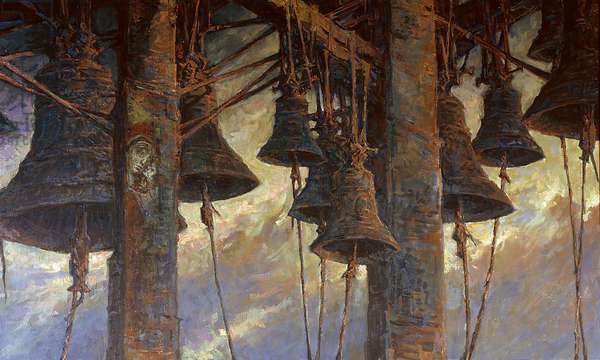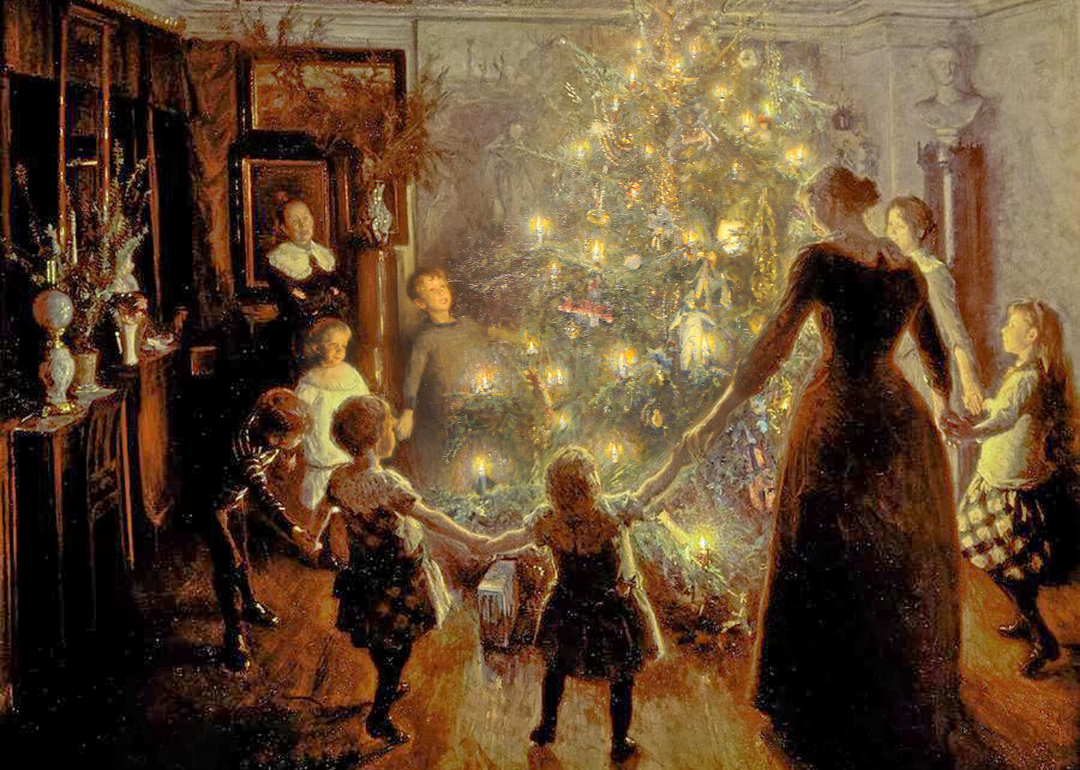“Peace on earth good will toward men …”
It is likely you will hear children sing these lines this Christmas. Perhaps your church has a children’s choir or a Christmas program where a group of cherub-like angels will sing the song to a few little boys and girls dressed up like shepherds. It is a lovely thing—to hear children sing of peace on earth. But it is also strange. While I scan the news on the internet and read about the continued war in Europe, the brutal civil war in Myanmar where families even fight against one another, and ongoing local reports of violence in street and home, — all the while in the background I can hear the kids practicing throughout the house—“Peace on earth good will toward men …”. Suddenly, it seems like a fantasy, just for children. Grown-ups read the news, grown-ups go to war; they don’t skip about the house and sing naively about peace on earth. Peace: it seems like a child’s dream.
That is not to say grownups don’t speak about peace. Unlike in the minds of children at Christmas, “peace” in the grown up world is spoken often but as an elusive hope and longing. Rather than something that is present, “peace” in the world is a goal that remains continually beyond reach. It is the high ideal of the individual, of society, of the state and yet one rarely gets a glimpse of it. All talk of peace is filled with tragic, inescapable irony—(children don’t get irony—that’s a grownup thing). Thus, for example, the Nobel Peace Prize—established by the inventor of dynamite—was awarded this year to two humanitarian organizations, one in Russia and one in Ukraine, even as the two countries strain against each other with gun and bomb. That is the real world. That is the world into which our children have been born even though they do not yet know it. That is the world in which the children of countless other mothers and fathers live and die as casualties of a peace not found.
Perhaps one of the most memorable expressions of this grownup irony was penned by Henry Wadsworth Longfellow during the American Civil War:
“I heard the bells on Christmas day,
their old familiar carols play,
and wild and sweet the words repeat,
peace on earth good will towards men.
Then from each black, accursed mouth
The cannon thundered in the South,
And with the sound
The carols drowned
Of peace on earth, good-will to men!
In despair I bowed my head,
there is no peace on earth I said,
but hate is strong
and mocks the song
of peace on earth good will towards men.”

Yet here we are on Christmas Eve—and it’s not just the children who sing songs of peace on earth. Prophets and angels also have the words of peace on their lips, promises of peace in their songs. Isaiah often gets one of the main solos, singing a mighty song of peace.
“The wolf shall dwell with the lamb,
and the leopard shall lie down with the young goat,
and the calf and the lion and the fattened calf together;
and a little child shall lead them.
… The child shall play over the hole of the cobra,
and put his hand into the adder’s den.
They shall not hurt or destroy
in all my holy mountain.”
But perhaps the most vivid promise of peace comes from chapter 2:
“It shall come to pass in the latter days
that the mountain of the house of the Lord
shall be established as the highest of the mountains,
and shall be lifted up above the hills;
and all the nations shall flow to it,…”
And He shall judge between the nations,
and shall decide disputes for many peoples;
and they shall beat their swords into plowshares,
and their spears into pruning hooks;
nation shall not lift up sword against nation,
neither shall they learn war anymore.”
Remarkable words: in Isaiah’s day, to be sure, when the nations around Judah—were drawing their swords and pounding their spears against their shields, making ready to war against them. Is the prophet completely out of touch with reality? Does he live in the world of children’s dreams? Could one even imagine such a thing, a world without the sword—a world where an instrument of death and violence has been transformed into a device that brings forth sustenance and life. Could we imagine such a thing?
One author, Mary Lou von Rossum, reflected on the strain that such a vision places on our imaginations—even the imaginations of her children: She writes,

“I read Isaiah to them and they listened motionless with saucer eyes until one tiny face, quite wonder-wide, broke out in speech, “What is a ploughshare?” “What is a pruning hook?” And so I told them of the shining blades that cut the earth to make it pliant so the seed may grow and bring forth fruit, and of the slender pole that moves among the branches stripping them of what they have no need, that they may flourish for God and for us.
And then I thought, perchance, someday, in some fair land a child would ask, “What is a sword?” “What is a spear?”
But children do not yet ask that question. So what is this peace that the prophets promised so long ago, what is that peace of which the angels sang, what is that peace that not just children but we as well this night do sing? The apostle Paul says this peace passes all human understanding (Phil. 4:7). It is the kind of peace that cannot be created by us—no negotiations, no treaty, no amount political activism or pacifism—for this peace heals a hostility that lies deeper than any human effort can reach. That is why the apostle always marries this peace with grace: “Grace and peace to you,” Paul writes again and again, “Grace and peace to you from God our Father and the Lord Jesus Christ.”
This is after all, what this night is about: the grace and peace of God our Father and our Lord Jesus Christ. Peace it is indeed the dream of a child, but it is not a childish dream:
“For unto us a child is born, unto us a Son is given
and the government shall be upon his shoulder,
and his name shall be called
Wonderful Counselor, Mighty God,
Everlasting Father, Prince of Peace.
Of the increase of his government and of peace
there will be no end,” (Isa. 9:6-7)
Yes, a child—but no soft, sweet nativity scene here—but a child born into the harsh reality of an indifferent, fearful, hostile world. A child whose birth was less an occasion for lovely lullabies’ than Herod’s raging and violence. A child thrust into the den of the adder, into the midst of a brood of vipers spitting the murderous venom of humanity’s inhumanity.
A child born to bear the sin of all—the sin that puts enmity between us and God, that raises up a wall of hostility between one another. “For he himself is our peace,” said the apostle Paul, “who … has broken down in his flesh the dividing wall of hostility … that he might reconcile us both to God in one body through the cross, thereby killing the hostility. And he came and preached peace to you who were far off and peace to those who were near” (Eph. 2:14-17). He came to suffer at the hands of violent men, suffering even death on a cross. And then … he rose again. Can you imagine such a thing? Could you dream of such a thing? That the cross—this instrument of violence and death has now through his death been transformed into the instrument of life and peace!
The child who was born to die—died so that in taking up his life again—we might live and in him have that peace that passes all understanding. He has given us this peace—entrusts it to us even. It rests on us his people and like God’s Son, this peace is incarnate and palpable in the caring hands that touch, in the arms that embrace, in the backs that bear burdens for others, and in the words that share the gospel of Christ’s peace.
That Longfellow poem … I didn’t quite finish it. I ended with the second to last verse:
And in despair I bowed my head;
“There is no peace on earth,” I said;
”For hate is strong,
And mocks the song
Of peace on earth, good-will to men!”
But there is another, final verse:
Then pealed the bells more loud and deep:
“God is not dead, nor doth He sleep;
The Wrong shall fail,
The Right prevail,
With peace on earth, good-will to men.”
God is not dead, nor doth He sleep. Nor are we. For in the death and resurrection of Christ, death our final enemy has been transformed into but a momentary slumber … so that when from it we awake, it will not be a dream, but peace on earth, good-will to men.


Leave a Reply
You must be logged in to post a comment.